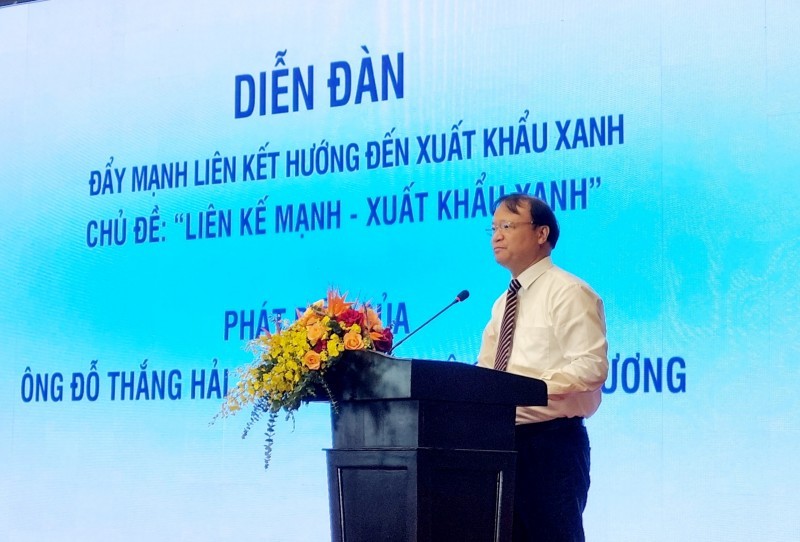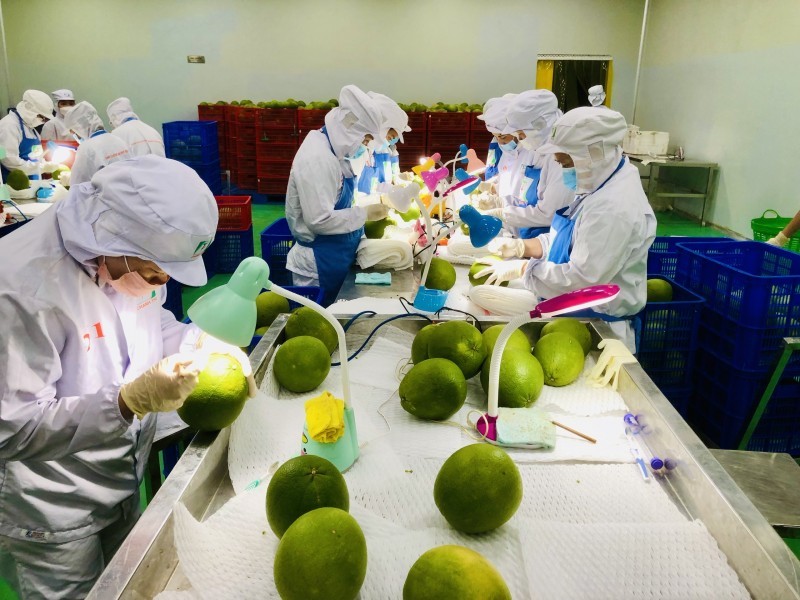Strengthening Vietnam's regional linkages for sustainable green exports
In line with the direction of sustainable development and meeting international requirements for circular economy, the regional linkage strategy between Ho Chi Minh City and other provinces and cities aims at green exports.
Strengthening regional linkages and harnessing the strengths of each province and city is crucial to promoting sustainable and green exports, according to experts at a forum on the subject held in Ho Chi Minh City on May 25.
The Forum on Strengthening Regional Linkages for Sustainable Green Exports in Vietnam brought together experts from various sectors to discuss key challenges and opportunities facing Vietnam's economy, given the global economic uncertainty and growing demand for sustainable products.
| Deputy Minister of Industry and Trade Do Thang Hai addressed the event. Photos: Cong thuong newspaper |
Speaking at the forum, Deputy Minister of Industry and Trade Do Thang Hai said Vietnam's economy faced many challenges in the first quarter of 2023, with many industries dealing with a drop in demand and some markets freezing. These difficulties have led to job cuts in many enterprises, making the situation even more challenging.
The complicated situation is further complicated by stricter requirements for sustainable products from major markets such as the US, EU, Japan, South Korea, and China, which poses significant challenges for Vietnamese businesses.
While there has been rapid growth in Vietnam's agriculture, forestry, and seafood exports in recent years, there is still strong competition from countries such as China, Thailand, Bangladesh, Indonesia and India.
"To remain competitive, they will need to meet not only the demand for quality products but also more stringent sourcing, environmental, and social standards," he said.
The high cost of logistics - 20 to 25% of the total cost of exporting in Vietnam, compared with 10 to 15% in other countries in the region - and a lack of infrastructure in some key areas, like the Mekong Delta, are other obstacles to sustainable exporting, Hai added.
Vo Van Hoan, vice chairman of the Ho Chi Minh City People's Committee, noted that Vietnam's largest city is the center of the key economic region in the south, the area with the highest growth rate in the southeast, a leader in international economic integration, and has the highest export turnover in the country.
However, he added that consumer demand has declined since the beginning of 2023, which will negatively affect the export activities of the city and the country as a whole due to the strong impact of political conflicts and global inflation.
"Moreover, the disadvantage of the city is the lack of effective links within the southeastern region to optimize its export potential and achieve sustainable development," he said.
| It is essential to develop regional linkages to boost economic growth and advance exports. |
Nguyen Mai, Chairman of the Vietnam Association of Foreign Invested Enterprises, said that in the current competitive environment, the development of regional linkages is essential for economic growth and export promotion.
"The key is to cooperate in investment, trade, tourism, and service development to tap each region's potential, connect with other economic centers, and enhance the country's national competitiveness in regional competition," he said.
Dr. Vo Tri Thanh, Director of the Institute for Brand and Competitiveness Strategy, pointed out that sustainable development and green growth are the new global trends, and enterprises must adopt sustainable production methods to keep up.
He urged businesses to optimize their supply chains and prioritize the development of green supply chains while meeting global demand trends. The State needs to reform policies, fulfill commitments in free trade agreements (FTAs), and provide training and communication to ensure that green supply chains have a sound legal framework to develop.
The Vice Chairman of the Ho Chi Minh City People's Committee said that the world is changing under the pressure of dwindling natural resources, pollution, and climate change, and consumers are becoming more environmentally conscious and shifting towards sustainable and eco-friendly products.
"Therefore, sustainable development and green growth are essential for Vietnam's exports to remain competitive in the global market," he stressed.
Hoan added that Ho Chi Minh City has been proactive in developing plans, solutions, and action programs to promote regional linkages in trade and services. Based on its strengths in production, trade, and services, the city has also proposed strategies for the economic development of each locality to serve both domestic and export markets.
In the long term, in line with the direction of sustainable development and to meet international requirements for circular economy, he said the regional linkage strategy between Ho Chi Minh City and other provinces and cities will aim at green exports.













